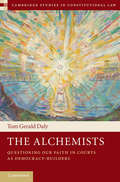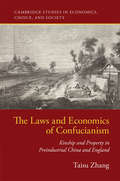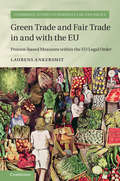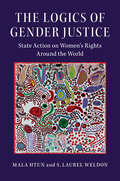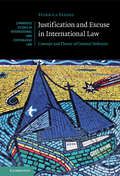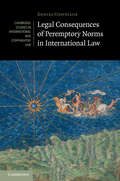- Table View
- List View
Cambridge Studies In International and Comparative Law: Proof of Causation in Tort Law
by Sandy SteelCausation is a foundational concept in tort law: in claims for compensation, a claimant must demonstrate that the defendant was a cause of the injury suffered in order for compensation to be awarded. Proof of Causation in Tort Law provides a critical, comparative and theoretical analysis of the general proof rules of causation underlying the tort laws of England, Germany and France, as well as the exceptional departures from these rules which each system has made. Exploring the different approaches to uncertainty over causation in tort law, Sandy Steel defends the justifiability of some of these exceptions, and categorises and examines the kinds of exceptional rules suggested by the case law and literature. Critically engaged with both the theoretical literature and current legal doctrine, this book will be of interest to private law scholars, judges and legal practitioners.
Cambridge Studies in Constitutional Law: Bills of Rights in the Common Law
by Robert LeckeyScholars have addressed at length the 'what' of judicial review under a bill of rights - scrutinizing legislation and striking it down - but neglected the 'how'. Adopting an internal legal perspective, Robert Leckey addresses that gap by reporting on the processes and activities of judges of the highest courts of Canada, South Africa and the United Kingdom as they apply their relatively new bills of rights. Rejecting the tendency to view rights adjudication as novel and unique, he connects it to the tradition of judging and judicial review in the Commonwealth and identifies respects in which judges' activities in rights cases genuinely are novel - and problematic. Highlighting inventiveness in rights adjudication, including creative remedies and guidance to legislative drafters, he challenges classifications of review as strong or weak. Disputing claims that it is modest and dialogic, he also argues that remedial discretion denies justice to individuals and undermines constitutional supremacy.
Cambridge Studies in Constitutional Law: Building the Constitution
by James FowkesThis revisionary perspective on South Africa's celebrated Constitutional Court draws on historical and empirical sources alongside conventional legal analysis to show how support from the African National Congress government and other political actors has underpinned the Court's landmark cases, which are often applauded too narrowly as merely judicial achievements. Standard accounts see the Court as overseer of a negotiated constitutional compromise and as the looked-to guardian of that constitution against the rising threat of the ANC. However, in reality South African successes have been built on broader and more admirable constitutional politics to a degree no previous account has described or acknowledged. The Court has responded to this context with a substantially consistent but widely misunderstood pattern of deference and intervention. Although a work in progress, this institutional self-understanding represents a powerful effort by an emerging court, as one constitutionally serious actor among others, to build a constitution.
Cambridge Studies in Constitutional Law: Dimensions of Dignity
by Jacob WeinribIn an age of constitutional revolutions and reforms, theory and practice are moving in opposite directions. As a matter of constitutional practice, human dignity has emerged in jurisdictions around the world as the organizing idea of a groundbreaking paradigm. By reconfiguring constitutional norms, institutional structures and legal doctrines, this paradigm transforms human dignity from a mere moral claim into a legal norm that persons have standing to vindicate. As a matter of constitutional theory, however, human dignity remains an enigmatic idea. Some explicate its meaning in abstraction from constitutional practice, while others confine themselves to less exalted ideas. The result is a chasm that separates constitutional practice from a theory capable of justifying its innovations and guiding its operation. By expounding the connection between human dignity and the constitutional practices that justify themselves in its light, Jacob Weinrib brings the theory and practice of constitutional law back together.
Cambridge Studies in Constitutional Law: Questioning our Faith in Courts as Democracy-Builders (Cambridge Studies in Constitutional Law #18)
by Daly Tom GeraldCan courts really build democracy in a state emerging from authoritarian rule? This book presents a searching critique of the contemporary global model of democracy-building for post-authoritarian states, arguing that it places excessive reliance on courts. Since 1945, both constitutional courts and international human rights courts have been increasingly perceived as alchemists, capable of transmuting the base materials of a nascent democracy into the gold of a functioning democratic system. By charting the development of this model, and critically analysing the evidence and claims for courts as democracy-builders, this book argues that the decades-long trend toward ever greater reliance on courts is based as much on faith as fact, and can often be counter-productive. Offering a sustained corrective to unrealistic perceptions of courts as democracy-builders, the book points the way toward a much needed rethinking of democracy-building models and a re-evaluation of how we employ courts in this role.
Cambridge Studies in Contentious Politics: Force and Contention in Contemporary China
by Ralph A. Thaxton Jr.Why is contemporary China such a politically contentious place? Relying on the memories of the survivors of the worst catastrophe of Maoist rule and documenting the rise of resistance and protest at the grassroots level, this book explains how the terror, hunger, and loss of the socialist past influences the way in which people in the deep countryside see and resist state power in the reform era up to the present-day repression of the People's Republic of China central government. Ralph A. Thaxton, Jr provides us with a worm's-eye view of an 'unknown China' - a China that cannot easily or fully be understood through made-in-the-academy theories and frameworks of why and how rural people have engaged in contentious politics. This book is a truly unique and disturbing look at how rural people relate to an authoritarian political system in a country that aspires to become a stable world power.
Cambridge Studies in Early Modern British History: Martial Law and English Laws, c. 1500–c. 1700
by John M. CollinsJohn M. Collins presents the first comprehensive history of martial law in the early modern period. He argues that rather than being a state of exception from law, martial law was understood and practiced as one of the King's laws. Further, it was a vital component of both England's domestic and imperial legal order. It was used to quell rebellions during the Reformation, to subdue Ireland, to regulate English plantations like Jamestown, to punish spies and traitors in the English Civil War, and to build forts on Jamaica. Through outlining the history of martial law, Collins reinterprets English legal culture as dynamic, politicized, and creative, where jurists were inspired by past practices to generate new law rather than being restrained by it. This work asks that legal history once again be re-integrated into the cultural and political histories of early modern England and its empire.
Cambridge Studies in Economics, Choice, and Society: Kinship and Property in Preindustrial China and England (Cambridge Studies in Economics, Choice, and Society)
by Taisu ZhangTying together cultural history, legal history, and institutional economics, The Laws and Economics of Confucianism: Kinship and Property in Pre-Industrial China and England offers a novel argument as to why Chinese and English pre-industrial economic development went down different paths. The dominance of Neo-Confucian social hierarchies in Late Imperial and Republican China, under which advanced age and generational seniority were the primary determinants of sociopolitical status, allowed many poor but senior individuals to possess status and political authority highly disproportionate to their wealth. In comparison, landed wealth was a fairly strict prerequisite for high status and authority in the far more 'individualist' society of early modern England, essentially excluding low-income individuals from secular positions of prestige and leadership. Zhang argues that this social difference had major consequences for property institutions and agricultural production.
Cambridge Studies in Economics, Choice, and Society: The Ethics of Influence
by Sunstein Cass R.In recent years, 'Nudge Units' or 'Behavioral Insights Teams' have been created in the United States, the United Kingdom, Germany, and other nations. All over the world, public officials are using the behavioral sciences to protect the environment, promote employment and economic growth, reduce poverty, and increase national security. In this book, Cass R. Sunstein, the eminent legal scholar and best-selling co-author of Nudge (2008), breaks new ground with a deep yet highly readable investigation into the ethical issues surrounding nudges, choice architecture, and mandates, addressing such issues as welfare, autonomy, self-government, dignity, manipulation, and the constraints and responsibilities of an ethical state. Complementing the ethical discussion, The Ethics of Influence: Government in the Age of Behavioral Science contains a wealth of new data on people's attitudes towards a broad range of nudges, choice architecture, and mandates.
Cambridge Studies in Election Law and Democracy: Fragile Democracies
by Samuel IssacharoffTwenty-five years after the fall of the Berlin Wall, the democratic ascendency of the post-Soviet era is under severe challenge. While fragile democracies in Eastern Europe, Africa, and East Asia face renewed threats, the world has witnessed the failed democratic promises of the Arab Spring. What lessons can be drawn from these struggles? What conditions or institutions are needed to prevent the collapse of democracy? This book argues that the most significant antidote to authoritarianism is the presence of strong constitutional courts. Distinct in the third wave of democratization, these courts serve as a bulwark against vulnerability to external threats as well as internal consolidation of power. Particular attention is given to societies riven by deep divisions of race, religion, or national background, for which the courts have become pivotal actors in allowing democracy to take root.
Cambridge Studies in English Legal History: Insurance in Elizabethan England
by Guido RossiEnglish insurance came into being almost entirely during the Elizabethan period. However, the Great Fire of 1666 consumed most of London's mercantile document, and therefore little is known about early English insurance. Using new archival material, this study provides the first in-depth analysis of early English insurance. It focuses on a crucial yet little-known text, the London Insurance Code of the early 1580s, and shows how London insurance customs were first imported from Italy, then influenced by the Dutch, and finally shaped in a systematic fashion in that Insurance Code. The London Insurance Code was in turn heavily influenced by coeval continental codes. This deep influence attests the strong links between English and European insurance, and questions the common/civil law divide on the history of commercial law.
Cambridge Studies in European Law and Policy: EU Renewable Electricity Law and Policy
by Tim Maxian RuscheThere are two basic policy tools for promoting renewable electricity: price regulation (feed-in tariffs) and quantity regulation (green certificates). In economic theory, they are equally efficient. Contrary to conventional thinking, the author demonstrates that under real-world conditions, price regulation is more efficient. EU law obliges Member States to put support schemes in place, but leaves their design to national authorities. They need, however, to comply with EU state aid and internal market rules, and their financing may not result in import duties and discriminatory taxation. This book provides a detailed analysis of the decisions practice adopted by the Commission and the case law of the Union Courts. As support schemes mature, has time not come for putting an end to regulatory competition? With huge efficiency gains to be expected, the author expertly examines the political obstacles and sets out three different pathways to achieve EU-wide harmonization.
Cambridge Studies in European Law and Policy: European Constitutionalism
by Kaarlo TuoriEuropean Constitutionalism redraws the perimeters in the debate on the nature of the European constitution. Offering a fresh approach to both doctrinal and theoretical issues, this book discusses general characteristics of the European constitution under the headings of relationality, perspectivism and discursiveness, and contains forays to sectoral constitutionalization in the micro- and macroeconomic, social and security dimensions. European constitutionalism must be examined in its interaction with Member State constitutionalism, which plays an essential role in channelling democratic legitimacy to the EU. Written by a leading expert in the field, this book will be of great interest to students and scholars alike.
Cambridge Studies in European Law and Policy: Frontex and Non-Refoulement
by Roberta MungianuSince the Frontex Border Agency's establishment in 2004, its activities have foregrounded the complexity and difficulty of protecting the human rights of those seeking access to the European Union. In this connection, protection from refoulement should be paramount in the Agency's work. By navigating through the intricacies of Frontex's structure and working methods, this book answers abiding questions: which circumstances would trigger European Union responsibility if violations were to occur in Frontex's joint operations? What is the legal standing of the principle of non-refoulement in relation to Frontex's activities? Can Frontex be entrusted with an exclusive search and rescue mandate? This book offers a theoretical and practical insight into the legislative intricacies of Frontex's work, examining the responsibility of the EU, and scrutinising the interaction of international law and EU law with a focus on the principle of non-refoulement.
Cambridge Studies in European Law and Policy: Process-based Measures within the EU Legal Order (Cambridge Studies in European Law and Policy)
by Laurens AnkersmitThis book explores how EU law constrains the freedom of the EU, the Member States, and private bodies to adopt measures that seek to protect social and environmental interests abroad by placing conditions on production processes in other states. The permissibility of such process-based measures has been examined primarily within the World Trade Organization (WTO) context, but the challenges that they present are equally for the EU internal market system. Ankersmit identifies three core challenges posed by process-based measures from an EU law perspective: extraterritoriality, unilateralism and the competitive and democratic problems created by private rule-making. It examines these issues in the context of free movement, competition, public procurement, and EU tax law. This book will appeal to academics, policy makers and practitioners interested in trade and environment, the social impact of trade law, and European and international market regulation.
Cambridge Studies in European Law and Policy: The Governance of EU Fundamental Rights
by Mark DawsonIn spite of a continued increase in the substantive scope and reach of EU fundamental rights, little attention has been paid to their practical enforcement. In this book, Mark Dawson looks at the mechanisms through which EU fundamental rights are protected and enforced, closely examining the interrelation between the EU's pertinent legal and political bodies. He argues that in order to understand EU fundamental rights we must also understand the institutional, political and normative constraints that shape the EU's policies. The book examines the performance of different EU institutions in relation to rights and studies two important policy fields - social rights and rule of law protection - in depth.
Cambridge Studies in European Law and Policy: The International Responsibility of the European Union
by Casteleiro Andrés DelgadoWhen is the EU responsible under international law? Is the EU a 'special case' international organisation? The UN General Assembly's adoption of the ILC articles on the International Responsibility of International Organisations was only the catalyst for debate on this topic. In this book, the author examines the legal personality of the EU, how - if at all - its responsibility under international agreements is shared between Member States, and how the international responsibility of the EU relates to its internal responsibilities under EU law. By exploring how in practice such legal regimes as the ILC, UNCLOS, and the WTO have held the EU responsible, this book provides an innovative analysis of a fundamental aspect of the relationship between the EU and international law.
Cambridge Studies in Gender and Politics: State Action on Women's Rights Around the World (Cambridge Studies in Gender and Politics)
by Mala Htun S. Laurel WeldonWhen and why do governments promote women's rights? Through comparative analysis of state action in seventy countries from 1975 to 2005, this book shows how different women's rights issues involve different histories, trigger different conflicts, and activate different sets of protagonists. Change on violence against women and workplace equality involves a logic of status politics: feminist movements leverage international norms to contest women's subordination. Family law, abortion, and contraception, which challenge the historical claim of religious groups to regulate kinship and reproduction, conform to a logic of doctrinal politics, which turns on relations between religious groups and the state. Publicly-paid parental leave and child care follow a logic of class politics, in which the strength of Left parties and overall economic conditions are more salient. The book reveals the multiple and complex pathways to gender justice, illuminating the opportunities and obstacles to social change for policymakers, advocates, and others seeking to advance women's rights.
Cambridge Studies in International and Comparative Law: Climate Change Litigation
by Hari M. Osofsky Jacqueline Peel Peel, Jacqueline and Osofsky, Hari M.This examination of the role of litigation in addressing the problem of climate change focuses not only on how the massive and growing number of lawsuits influences regulation directly, but also on how the lawsuits shape corporate behaviour and public opinion. It provides readers with an understanding of how these lawsuits have shaped approaches to mitigation and adaptation, and have been used to try to force and to block regulation. There is a particular emphasis on lawsuits in the United States and Australia, the two jurisdictions which have had the most climate change litigation in the world, and the lessons provide broader insights into the role of courts in addressing climate change.
Cambridge Studies in International and Comparative Law: Concept and Theory of General Defences (Cambridge Studies in International and Comparative Law #130)
by Paddeu FedericaThe defences available to an agent accused of wrongdoing can be considered as justifications (which render acts lawful) or excuses (which shield the agent from the legal consequences of the wrongful act). This distinction is familiar to many domestic legal systems, and tracks analogous notions in moral philosophy and ordinary language. Nevertheless, it remains contested in some domestic jurisdictions where it is often argued that the distinction is purely theoretical and has no consequences in practice. In international law too the distinction has been fraught with controversy, though there are increasing calls for its recognition. This book is the first to comprehensively and thoroughly examine the distinction and its relevance to the international legal order. Combining an analysis of State practice, historical, doctrinal and theoretical developments, the book shows that the distinction is not only possible in international law but that it is also one that would have important practical implications.
Cambridge Studies in International and Comparative Law: Exclusion from Public Space
by Daniel MoeckliHardly known twenty years ago, exclusion from public space has today become a standard tool of state intervention. Every year, tens of thousands of homeless individuals, drug addicts, teenagers, protesters and others are banned from parts of public space. The rise of exclusion measures is characteristic of two broader developments that have profoundly transformed public space in recent years: the privatisation of public space, and its increased control in the 'security society'. Despite the fundamental problems it raises, exclusion from public space has received hardly any attention from legal scholars. This book addresses this gap and comprehensively explores the implications that this new form of intervention has for the constitutional essentials of liberal democracy: the rule of law, fundamental rights, and democracy. To do so, it analyses legal developments in three liberal democracies that have been at the forefront of promoting exclusion measures: the United Kingdom, the United States, and Switzerland.
Cambridge Studies in International and Comparative Law: Humanity at Sea
by Itamar MannThis interdisciplinary study engages law, history, and political theory in a first attempt to crystallize the lessons the global 'refugee crisis' can teach us about the nature of international law. It connects the dots between the actions of Jewish migrants to Palestine after WWII, Vietnamese 'boatpeople', Haitian refugees seeking to reach Florida, Middle Eastern migrants and refugees bound to Australia, and Syrian refugees currently crossing the Mediterranean, and then legal responses by states and international organizations to these movements. Through its account of maritime migration, the book proposes a theory of human rights modelled around an encounter between individuals in which one of the parties is at great risk. It weaves together primary sources, insights from the work of twentieth-century thinkers such as Hannah Arendt and Emmanuel Levinas, and other legal materials to form a rich account of an issue of increasing global concern.
Cambridge Studies in International and Comparative Law: International Law and Governance of Natural Resources in Conflict and Post-Conflict Situations
by Dam-de Jong, DaniëllaNatural resource wealth is conducive to a country's development. Nevertheless, the last few decades have shown a harsher reality, where natural resources have also triggered, financed or fuelled a number of internal armed conflicts. Examples include the armed conflicts in Cambodia, Sierra Leone, Liberia and the Democratic Republic of the Congo, which have been financed with the exploitation of a variety of valuable natural resources, including diamonds, gold, timber, oil and cocoa. The aim of this book is to assess the contribution of international law in ensuring that natural resources are used to promote development and to achieve sustainable peace instead of financing armed conflict. For this purpose, the author discusses the international legal framework for the governance of natural resources in States in general, in situations of armed conflict and as part of conflict resolution and post-conflict peacebuilding efforts.
Cambridge Studies in International and Comparative Law: Legal Consequences of Peremptory Norms in International Law (Cambridge Studies in International and Comparative Law #132)
by Daniel CostelloeWhen is a norm peremptory? This is a question that has troubled legal scholars throughout the development of modern international law. In this work, Daniel Costelloe suggests - through an examination of State practice and international materials - that it is the legal consequences of a norm which distinguish it as peremptory. This book sheds new light on the legal consequences that peremptory norms have, for instance, in the law of treaties, international responsibility and state immunity. Unlike their substance or identification, the consequences of peremptory norms have remained under-studied. This book is the first specifically on this topic and is essential reading for all scholars and practitioners of public international law.
Cambridge Studies in International and Comparative Law: Religious Hatred and International Law
by Jeroen TempermanThe UN International Covenant on Civil and Political Rights obliges state parties to prohibit any advocacy of religious hatred that constitutes incitement to discrimination or violence. This book traces the origins of this provision and proposes an actus reus for this offence. The question of whether hateful incitement is a prohibition per se or also encapsulates a fundamental 'right to be protected against incitement' is extensively debated. Also addressed is the question of how to judge incitement. Is mens rea required to convict someone of advocating hatred, and if so, for what degree of intent? This analysis also includes the paramount question if and to what extent content and/or context factors ought to be decisive. The author extensively engages with comparative domestic law and compares the workings of the UN Human Rights Committee with those of the UN Committee on the Elimination of Racial Discrimination and the European Court of Human Rights.

